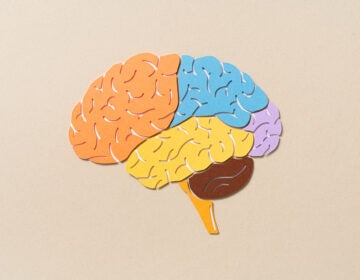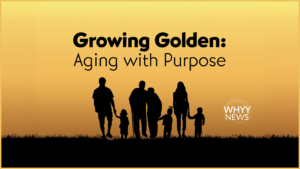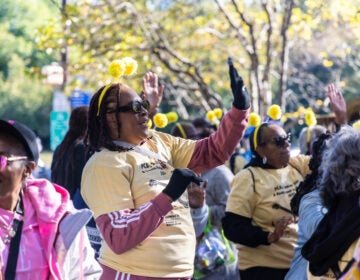‘Uncharted territory’: Philadelphians navigate growing old with HIV as more people survive longer
About half of all people living with HIV today are over the age of 50. By 2030, older survivors could make up as much as 70% of that population.
Listen 5:49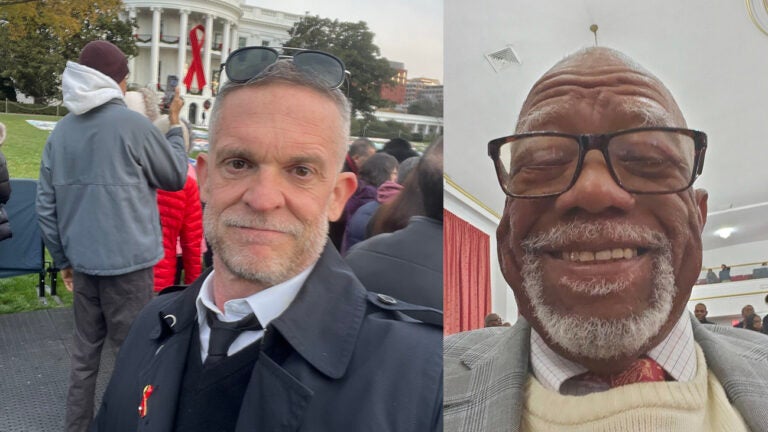
Jay Lassiter (left), of Cherry Hill, New Jersey, attended an observance for World AIDS Day on Dec. 1, 2024 on the White House South Lawn in Washington, D.C. Vernon Wright (right), of Philadelphia, is the founder of the Gordon-Wright Community Development Center, which provides HIV testing and counseling, drug and alcohol referrals and education. (Courtesy of Jay Lassiter/Vernon Wright, respectively)
From Philly and the Pa. suburbs to South Jersey and Delaware, what would you like WHYY News to cover? Let us know!
On a recent Wednesday morning, Jay Lassiter spent three hours putting together about 2,000 meals at MANNA in Philadelphia, which delivers medically tailored food to people who are ill.
Lassiter called his decision to start volunteering at the nonprofit part of a mid-life crisis, “which is not something that I would have expected to encounter, as a young teenage kid with HIV in the 1990s, is to live long enough to have a mid-life crisis.”
The 52-year-old, who lives in Cherry Hill, New Jersey, said his mid-life crisis is about focusing on doing things that are meaningful, which has become especially important as he’s gotten older and after 30 years of living with a chronic illness.
“I am not going to squander a second chance of longevity,” he said. “Part of not squandering my second chance is embracing and working really, really hard to ensure that my life is the way that I want it to be.”

Lassiter survived the peak of the HIV/AIDS crisis, when some of his friends and many others died before effective treatment came to market. He’s also battled drug and alcohol addiction as well as complications from early HIV medications like severe anemia to get to where he is today.
“I have a great life. I have an amazing partner, I have a cool job that makes me feel relevant and valid and rewarded,” he said. “But I’m exhausted. And that’s the thing. You live long enough with any disease and you’re going to get old and you’re going to have to contend with the trappings of longevity. It’s my feet, my knees, my hips, my back. And imagine living long enough to be worried about that kind of stuff — it is not lost on me.”
Before medications started to come out in the late ‘80s, an HIV diagnosis was almost certainly a death sentence. People lost partners and loved ones who often became emaciated and suffered through painful skin lesions, infections and organ failure.
Eventually, better combination medications effectively stopped the virus from replicating in a person’s body. Today’s HIV treatment options don’t have as many side effects and require fewer pills or injections.
That has left survivors like Lassiter thriving. But it also means he and others need to figure out how to live much longer lives than they ever anticipated having, with all the physical and mental health challenges that come with it.
“My reflections are leading me to a place where I am working through the [post-traumatic stress] that I never even knew I had,” Lassiter said.
Nearly half of all people living with HIV/AIDS in the United States are 50 and older, according to the National Institute on Aging. By 2030, researchers estimate that older survivors will represent as much as 70% of people living with this chronic disease.
Dr. Jay Kostman, chief medical officer at Philadelphia FIGHT, said health care is now shifting from simply keeping people alive to other primary care and health issues that aging HIV patients are now facing.
“You have to shift your gears to say, ‘Okay, we’re controlling the virus, but our patients have heart disease and are having heart attacks and strokes,’” he said.
Ongoing research is focused on identifying what health issues in older patients may be attributable to the virus and treatment medications versus genetics, other factors or even just aging itself.
Early findings suggest the disease puts survivors at a higher risk of developing cognitive, motor and mood disorders, frailty and cardiovascular disease.
Mental health and post-traumatic stress are also common themes that Kostman sees among his aging HIV patients.
“So, what it’s been like to live with HIV for a long period of time, how it’s affected their mental health, how it’s affected their relationship with family, with children, partners, parents,” he said.
Jeff Haskins remembers the anxiety, stress and trauma he lived through during the height of the HIV/AIDs epidemic, including the death of his partner.
He said those feelings have unexpectedly resurfaced later in life during major moments, like when he witnessed the 9/11 terrorist attacks while he was in New York City, the loss of both his parents and the COVID-19 pandemic.
“My anxiety rises and I’m always trying to just go through the mood changes and [asking], ‘Why am I feeling this way?’” Haskins said. “I’ll be like, ‘Oh, these feelings are back again, why are they here? I thought I was doing well.’”
Haskins, now 69, is the deputy director of Project TEACH at Philadelphia FIGHT, where he leads HIV educational and awareness programming. He was diagnosed with AIDS in 1993 and remembers how stigmatizing it was, when people still thought the virus could spread through casual contact and shared items.
“I mean, when you went over to a relative’s house and they took up the china and put down the paper plates or the plasticware as you were, you know, infected,” he said.
Haskins is now part of efforts to combat that kind of stigma. And he credits his good health and undetectable viral load to his faith, family and friends, and a team of medical specialists.
“I still got to pop a pill for having blood pressure, I still got to pop a pill for calcium,” he said. “Now, I take nine pills for aging, and only two of them are for HIV.”
Haskins also founded a program that focuses specifically on resources and support for people who are aging with HIV.
“Nobody told us how to do this,” he said. “And then most of us, those of us living with HIV, we didn’t think we were going to be here, so we didn’t plan.”

When Vernon Wright isn’t busy leading HIV community outreach training programs at local churches and houses of worship, he attends conferences and workshops for people who, like him, are living with HIV/AIDS and growing older.
“This is uncharted territory,” he said. “What can we do to help each other? Share information and ask each other, ‘what did you do when your health care got changed over? What did you do when the pharmaceuticals cut back your medications?’ It’s a lot of information that we have to sort among ourselves to help us have quality of life.”
Wright was in Baltimore in the mid-1990s and diagnosed with AIDS when he was about 37 years old. He initially hid his diagnosis from family and friends, and he didn’t know if the disease would kill him, but said he put a lot of hope into religion and faith.
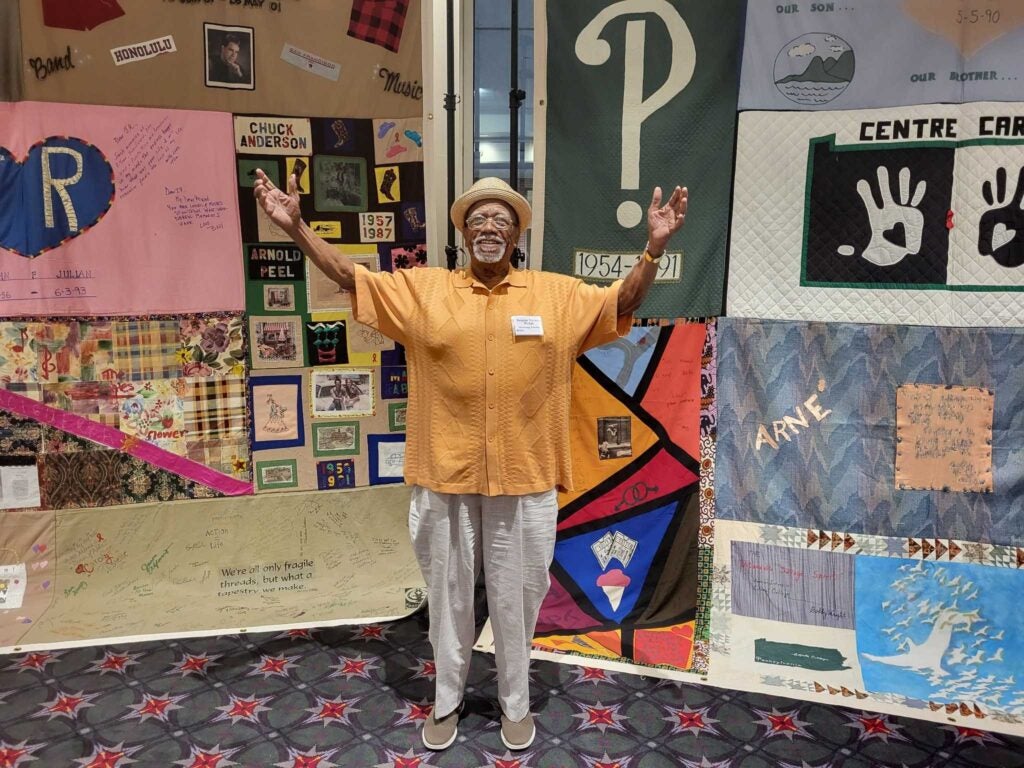
He then moved to Philadelphia, where he entered rehab for drug and alcohol and enrolled in some early HIV medications and treatments. Now, decades later at age 78, he shares a life with his wife and has watched his grandchildren, and several great-grandchildren, grow up.
Wright ultimately realized the virus wasn’t the biggest threat to his health, he said.
“I would die of old age stuff. Look, I got kidney disease, I got arthritis bad, I got artificial knees. You evolve,” he said, shrugging as he took a bite of pizza at a café in East Falls, just around the corner from where he gets dialysis three times a week.
Wright says it’s been a privilege to reach his golden years, even with the challenges of managing several different health conditions and AIDS.
But he believes that if he never got that diagnosis in his 30s, he probably would have never gotten sober, gone back to college to study behavioral health sciences, or would be working to help others manage and live with this chronic disease and addiction.
“It comes with the territory. I’d rather be like this than be on the other side of the grass,” he said. “I’d make that choice any time.”
For Jay Lassiter, staying on top of his health has been a priority for many years now and he’s taken advantage of every preventative health screening that’s become available to him.
“Because wouldn’t that be really ironic to survive the HIV/AIDS crisis and addiction and all those toxic meds just to fumble the ball and do something stupid like skipping a colonoscopy?” he asked.
He said he’s determined to give back and live a good, long life — not just for himself, but in honor of the many people who lost their lives to HIV/AIDS and never got a chance to grow old.
“My good life avenges that loss,” he said, pausing with emotion. “My good life is an act of defiance. I’m happy that I’m still here.”

Get daily updates from WHYY News!
WHYY is your source for fact-based, in-depth journalism and information. As a nonprofit organization, we rely on financial support from readers like you. Please give today.


